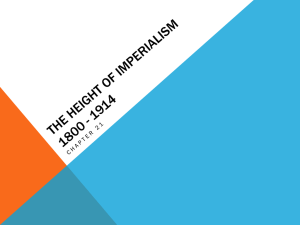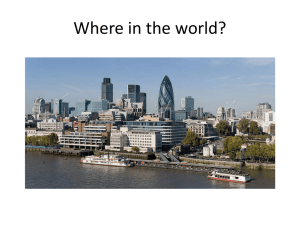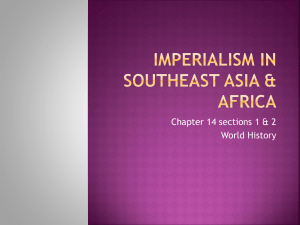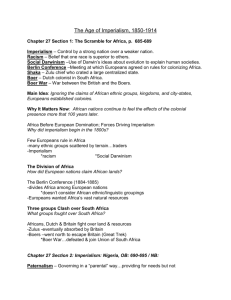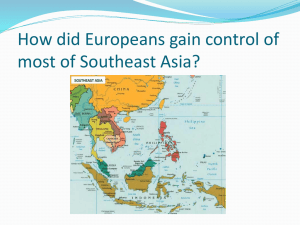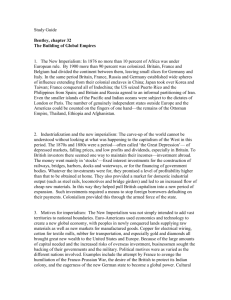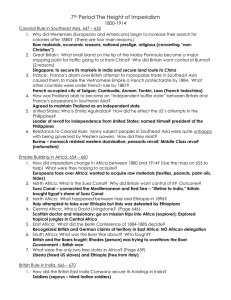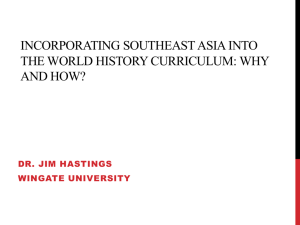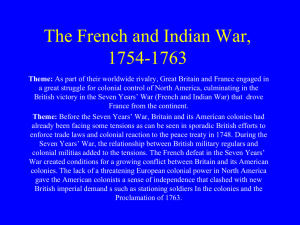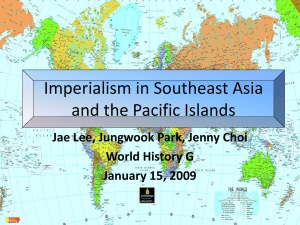AGE OF IMPERIALISM SOUTHEAST ASIA
advertisement
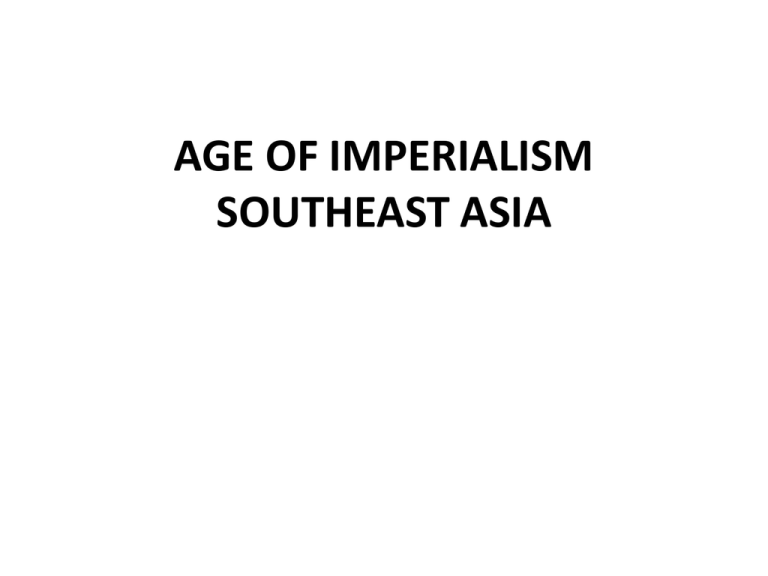
AGE OF IMPERIALISM SOUTHEAST ASIA New Imperialism • Imperialism = the extension of a nation’s power over other lands • New phase of Western expansion into Asia and Africa – Beginning in the 1800s European nations begin an intense scramble for overseas territories – Want direct control over vast territories Motives for Imperialism • Strong economic motive – Europeans view Asian and African societies as sources of industrial raw materials and markets for manufactured goods • Rivalries between European nations – Want colonies to gain advantage over rivals – Reflected struggles for power in Europe • Source of national pride – Idea that nations need colonies to be great – “all great nations in the fullness of their strength have the desire to set their mark upon barbarian lands and those who fail to participate in this great rivalry will play a pitiable role in time to come” • Social Darwinism – The best nation (race) wins • If you are able to conquer people, then you should be able to, survival of the fittest also applies to nations – Europeans are superior to other peoples – “the path of progress is strewn with the wrecks of nations; traces are everywhere to be seen of the slaughtered remains of inferior races” • “White Man’s Burden” – Europeans have a moral responsibility to civilize primitive people Colonial Takeover of Southeast Asia • Southeast Asia was a source of valuable spices • By 1800 only two societies in this area were ruled by Europeans: – Spanish Philippines – Dutch East Indies • By 1900 almost the entire area was under western rule, begins with Great Britain Great Britain • 1819 establishes a new colony on the tip of the Malay Peninsula called Singapore (“city of the lion” – 1824 acquired more of Malaysia from the Dutch • Took over the Kingdom of Burma (Myanmar) in the late 1800s – Want control of Burma to protect its interests in India – Burmese monarchy collapses, Britain establishes control over the entire country – Establish rubber plantations to provide raw materials for Britain France • French missionaries and traders are active in Vietnam in the early 1800s – The ruling dynasty started to persecute and expel the missionaries – Napoleon III sends a fleet to Vietnam • 1857 force Vietnam to accept French protection – Alarmed by British attempts to monopolize trade – 1884 take over the rest of Vietnam and makes it a French protectorate • Protectorate = a political unit that depends on another gov’t for its protection • 1880s annex neighboring Laos and Cambodia, which along with Vietnam, make up French Indochina Thailand (Siam) • Only nation in Southeast Asia to maintain its independence – Threatened by British and French interests • King Mongkut and King Chulalongkorn prevented colonization – Promoted western learning, maintained friendly relations with European powers, and exploited rivalries • 1896 Britain and France agree to maintain Thailand as an independent buffer state between Burma and French Indochina United States • 1898 Spanish-American War – Defeat the Spanish fleet in Manila Bay – Promise freedom to the Filipinos if they help the U.S. • President McKinley decides to turn the Philippines into an American colony instead – Jumping-off point for trade with China – Angers the Filipinos, who fight for independence and are defeated by the American troops – President McKinley assassinated in Buffalo, NY Colonial Regimes in Southeast Asia • Chief goals are to exploit natural resources and open markets • Governed either by indirect or direct rule – Indirect rule = local rulers were allowed to maintain their positions of authority and status • Cooperation with local political elites makes it easier to gain access to the region’s natural resources • Lowers the cost of gov’t, has less effect on local culture • Example: Dutch East Indies – local landed aristocrats maintain law and order and collect taxes in return for payment – Direct rule = local rulers are removed from power and replaced with a new set of officials brought from the mother country • Used in cases where local rulers resist foreign conquest • Example: Burma – monarchy resists and Britain abolishes and brings in officials from India and Britain • The colonized people pay high taxes to pay for these officials Colonial Economies • Colonial powers stress the policy of exporting raw materials – Don’t want colonists to develop their own industries • Plantation agriculture – peasants work as wage laborers on plantations owned by foreign investors – Kept at poverty level to increase profits, high taxes to pay for administrative costs – Thousands die due to unhealthy conditions • Benefits – Beginning of modern economic system – Built infrastructure – railroads, roads, canals – Developed export markets Resistance to Colonial Rule • Most people unhappy with Western rule – Resistance first comes from the ruling class – Peasants revolt – driven off their lands to make way for plantations – These early resistance movements fail • 20th century new resistance based on nationalism with westernized intellectuals – Use guerrilla warfare
